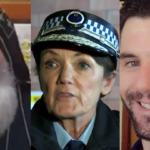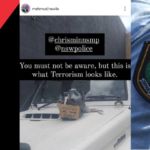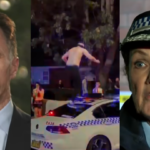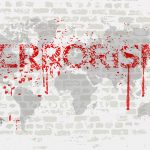The Terrorism Designation Is Going to Haunt Us All, as Is Another Recent Wrong Call
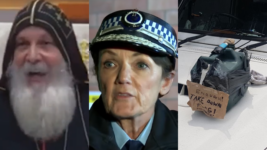
“The NSW Joint Counter Terrorism Team will investigate the stabbing of religious leaders at a church in Sydney’s southwest overnight,” read NSW Police News on Tuesday morning. “About 7.10 pm on Monday, police were called to a church… following reports of a stabbing.”
“A 16-year-old boy, who had been restrained by members of the public, was arrested by police,” state law enforcement continued, and then outlined what many are now shaking their heads about, which involved NSW police commissioner Karen Webb deeming “the incident terror-related”.
Indeed, perhaps the commissioner was feeling giddy on declaring a Muslim boy nonfatally stabbing Bishop Mar Mari Emmanuel of the Assyrian Orthodox Christ the Good Shepherd Church a terror act, as it had been a long night, which had included a riot, and it was late, 1.35 am, when she called it.
NSW premier Chris Minns went on to explain to the ABC on Tuesday night that the terror designation was applied as it opens up a range of investigative powers unavailable to a nonterror investigation.
But if the authorities aren’t sure that it is terrorism, the question that’s begged is, why announce it?
The recent stabbings have left the community on edge, and the terror label has only heightened this, with many considering it the wrong call, especially when compared with another recent decision, which saw NSW police downplay an incident that bore all the hallmarks of terrorism.
Late-night designations
The Terrorism (Police Powers) Act 2002 (NSW) carries the special powers the JCTT are now applying to the case of the teenager.
And section 3 of the Act defines a terror act as a criminal action done with the intention of advancing a political, religious or ideological cause through the coercion or intimation of government, part of the state, the public or a section of it.
Two days prior to the stabbing at a church in the western Sydney suburb of Wakeley, a 40-year-old Australian man of European descent stabbed six people to death, in what police advise appeared to be a manner that targeted women. However, the authorities were fast to call it a nonterror incident.
With the church stabbing involving an unidentified 16-year-old teenager whom it is know is Muslim having come right on the back of this other attack, as writer Randa Abdel-Fattah put it on X on Tuesday, this has reinforced the old trope whereby the idea of terrorist is associated with a Muslim.
Section 6 of the Act outlines that either the commissioner or their deputy can unlock these special investigative powers once they call a terror designation on the basis of being satisfied on reasonable grounds that a crime is terrorist in nature.
Nothing in the legislation, however, seems to suggest declaring to the entire community that this decision has been made is a requirement of unlocking powers.
And one must question how police minister Yasmine Catley felt about giving her concurrence to the designation, as required under section 9, at so late an hour – that is, unless she wasn’t contactable, and then her approval can be tacked on later.
A question of terror
After the late-night terror designation was sprung on an unsuspecting sleeping public, ASIO director general Mike Burgess appeared beside the PM at a Tuesday presser to bestow his blessing upon the destination, and he agreed that it appeared a “likely lone wolf” attack, when a reporter put it to him.
“The simple answer there is, to call it a terrorist attack you need indications of, well, information or evidence that suggests actually the motivation was religiously motivated or ideologically motivated,” Burgess explained on Tuesday. “In the case of Saturday, that was not the case.”
The chief spy then added that the information available regarding the church attack “would indicate strongly that that is the case and that’s why it was called an act of terrorism”.
However, Sheikh Wesam Charkawi called this decision out in a post on Thursday, outlining that “decades of academic research” refutes the notion that religion is a causal factor of terrorism, and he added that the authorities hadn’t adequately considered mental health factors.
“The Australian Muslim community finds itself caught in a cynical game of political manoeuvring,” Charkawi continued, and further called out Burgess over claiming in February that “Sunni violent extremism poses the greatest religiously motivated violent extremist threat in Australia”.
Webb’s designation of the recent incident, however, appears to slot neatly into the ASIO head’s version of how terror is playing out in the community at present, especially when the evidence, at least that publicly conveyed, points to a 16-year-old boy having acted alone.
Terror by any other name
Charkawi further pointed to the stark difference in naming Monday’s stabbing a terror incident being “technically applied” to enhance the inquiry, while, earlier this year, when a homemade bomb, with a political threat attached, was left in a Botany driveway, no such designation was made.
The sheikh was referring to Botany man Theo who found a homemade bomb sitting on his ute on 5 January, as the device was clearly left as a threat in response to a Palestinian flag Theo had hung in the front of his property, accompanied by a sign expressing his dismay over the Gaza genocide.
The explosive device was made from a jerry can partly filled with petrol and a rag hanging out the opening, as well as having large bolts taped to its edges and a lighter attached so anyone could come along and set it alight. And a note stuck to it read, “Enough! Take down flag! One chance!!!”
Yet, after the bomb squad inspected the device for a number of hours and then deemed it safe, the significance of the violent threat on a civilian’s life has since been progressively played down by NSW authorities.
“Haters gonna hate” commissioner Webb, however, made no terror designation in relation to the act that threatened serious harm if Theo didn’t remove his flag, even with the obvious political overtones, as the flag marked opposition to the Israel-perpetrated genocide against Palestinians.
NSW police neither put the terror unit on the case, but rather a junior officer was charged, and Israeli man David Wise was only raided and arrested over the incident in early March, after police had long known he’d been at the property spouting Zionist rhetoric prior to the device appearing.
And the charges eventually laid failed to reflect the seriousness of crime with one count of send article to cause alarm applying, along with two counts of stalking, another of use carriage service to menace, harass or cause offence, and a further count of unlawfully enter inclosed land.
Theo told Sydney Criminal Lawyers late in March that he and a large number of supporters were able to apply pressure to the authorities and have the case sent to the Commonwealth Director of Public Prosecutions, so they can make a fresh determination on how to proceed.
The Botany man further explained that he had experienced such a groundswell of support as many people are now fearful that a member of the community was able to leave a homemade bomb at his place and that this threat to his life, was then played down by authorities.
Together these acts speak volumes
Why NSW police decided not to designate the homemade bomb incident terrorist in nature, while making such a determination in relation to the church stabbing is not readily apparent, but what is crystal clear are the messages being conveyed to the public.
As Theo has spelt out, the most traumatic aspect to his life being threatened has been the subsequent lack of urgency or attention given to the inquiry by NSW police, as it’s provided no deterrence to other such actors and nor has it indicated that the act was taken seriously.
The disparate attention given to the two incidents further comes on the back of the premier having openly indicated his support for Israel, which has been perpetrating a mass slaughter of people, whilst he’s also repeatedly condemned the presence of pro-Palestinian protesters as problematic.
And while Minns is currently waxing lyrical about social cohesion, the clear and apparent prejudices involved in the response by the NSW government and the NSW police at present are certainly on display via their actions, even if this position isn’t specifically noted in policy.
“The fact that the charges against Wise were what they were seems bizarre,” Theo said in late March. “And I’m very concerned that it creates tacit permission to many other people that have been making threats and attacks towards Palestinians and their supporters.”
And these concerns of Theo’s have certainly not been assuaged by the actions of the NSW authorities over the past week, as what’s occurred would only seem to heighten his and his supporters’ fears.


